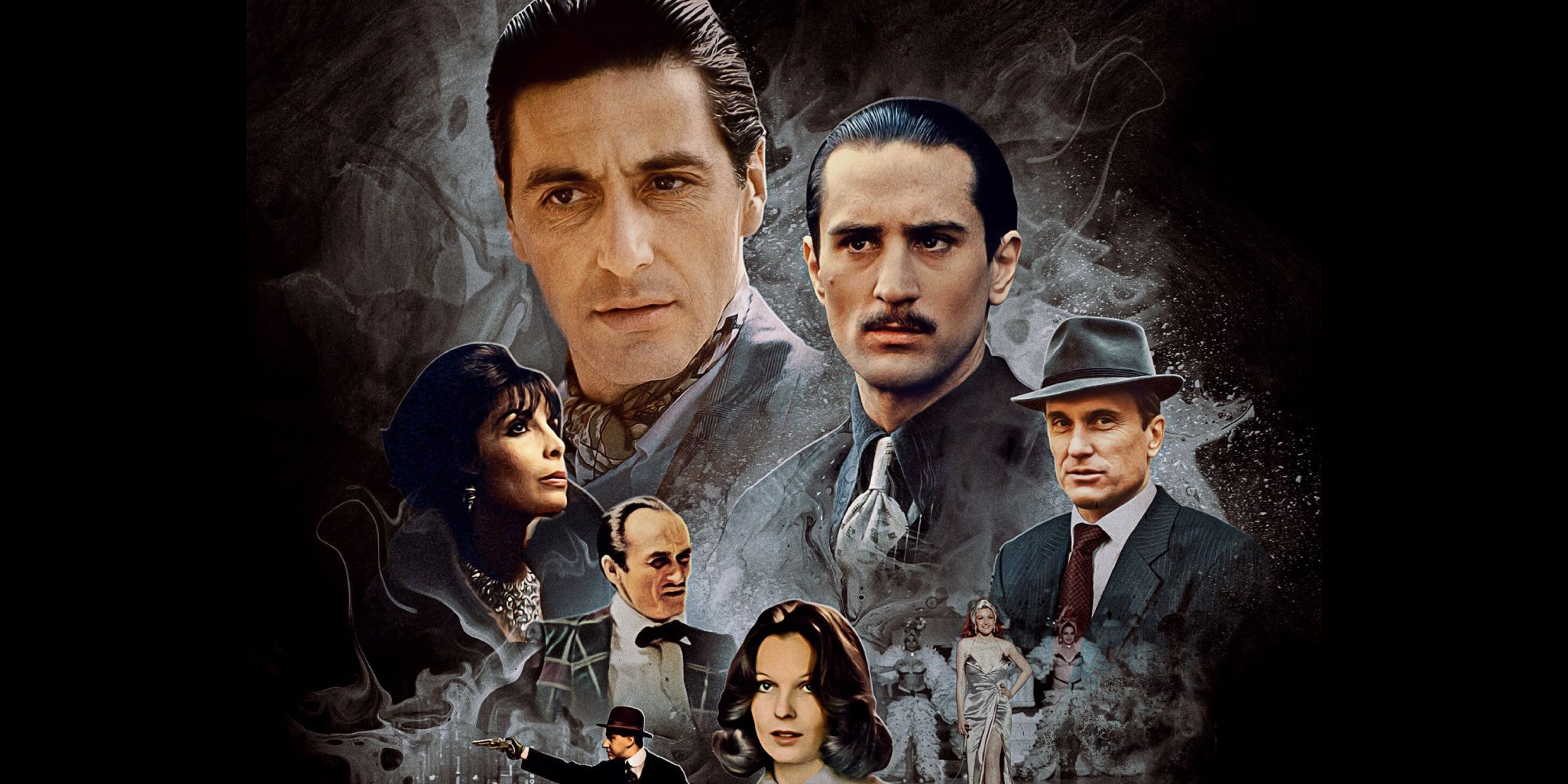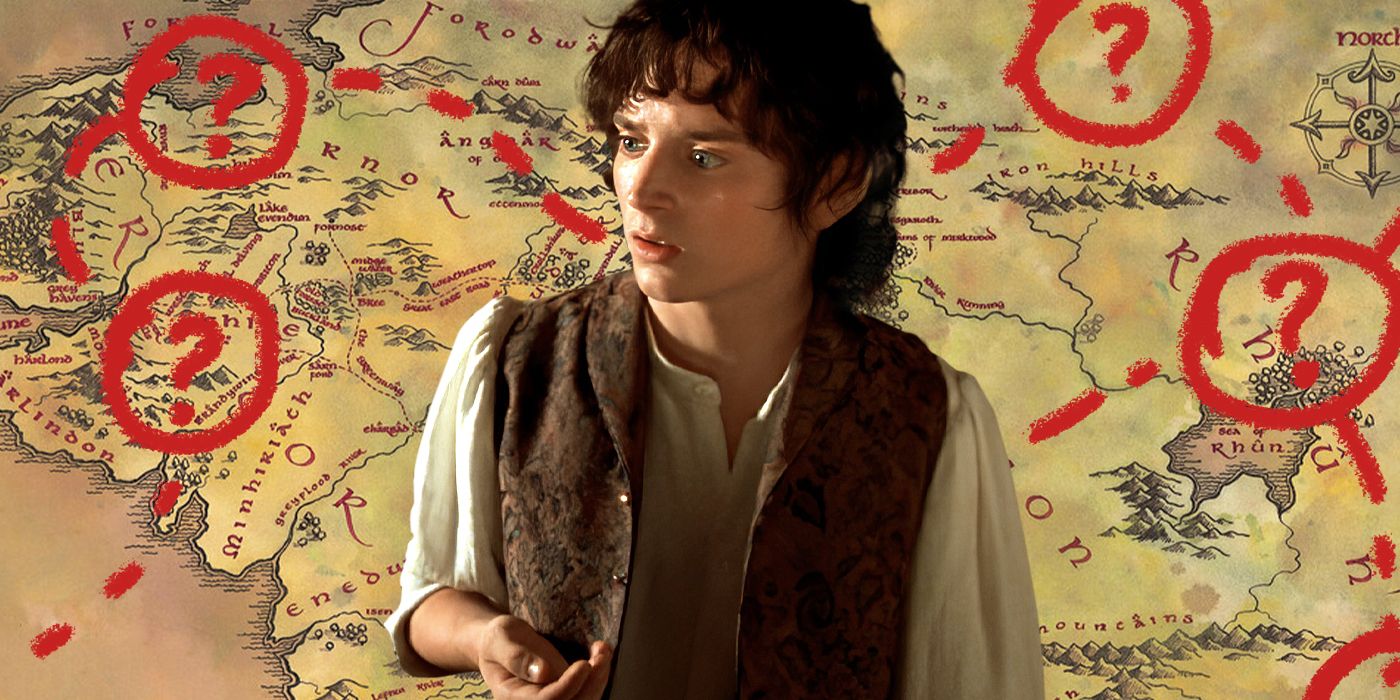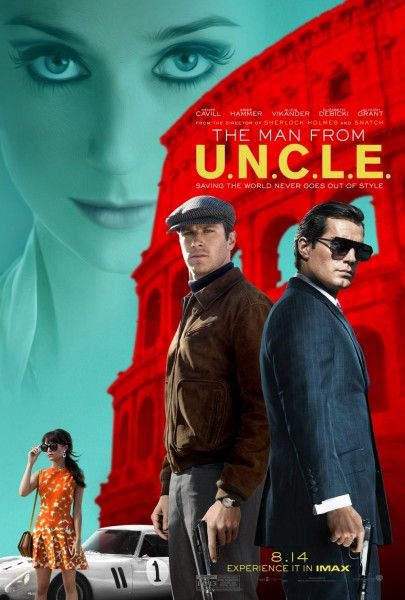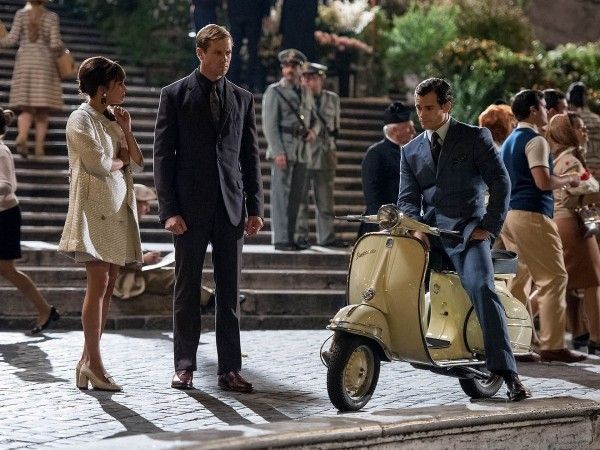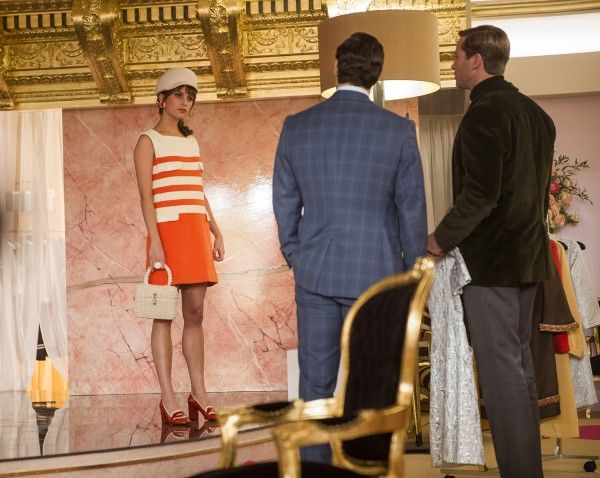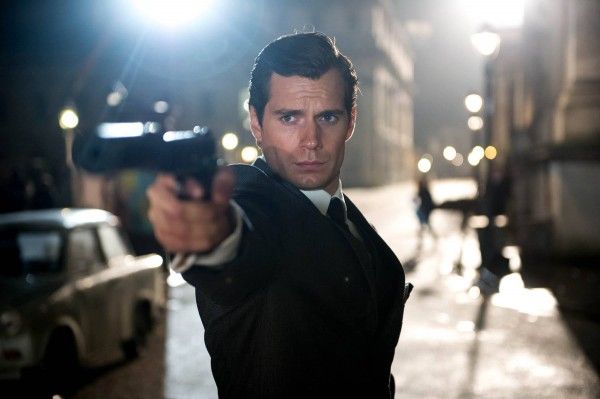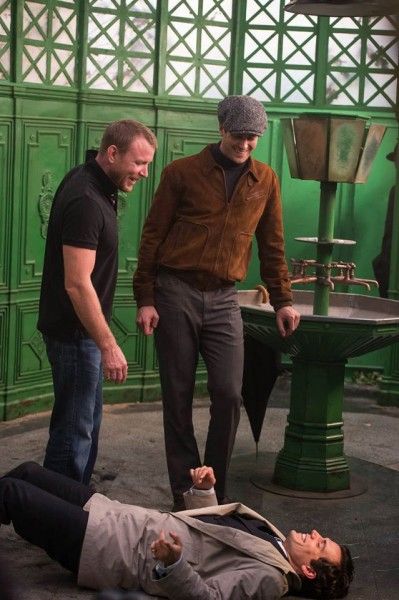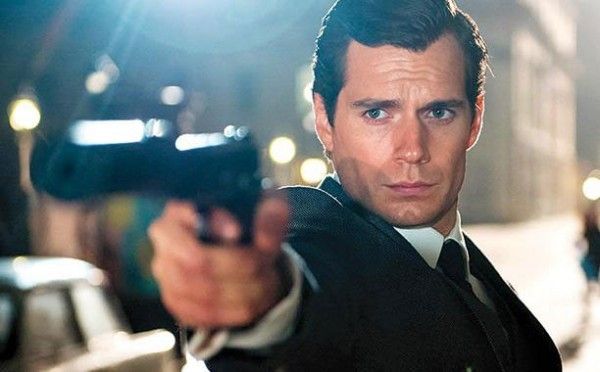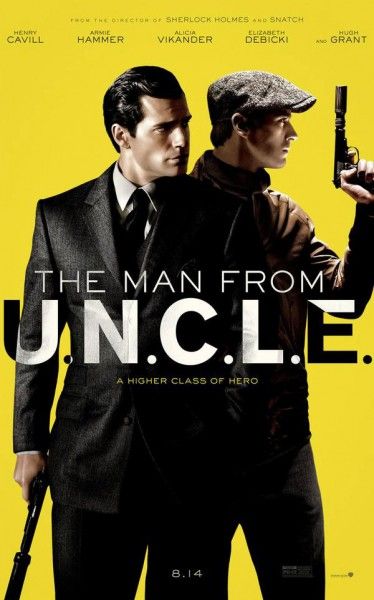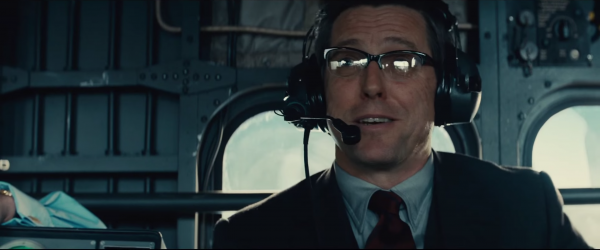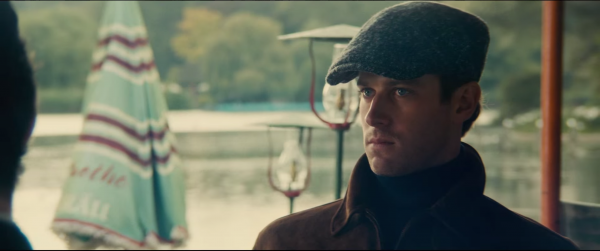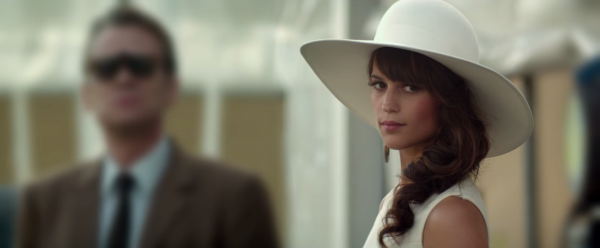Over the past few years, producer Lionel Wigram has been involved in a number of films we’ve all enjoyed like the final Harry Potter movies, Sherlock Holmes, and Sherlock Holmes: Game of Shadows. With his great working relationship with directorGuy Ritchie, it wasn’t a surprise to see Wigram hard at work on the London set of The Man from U.N.C.L.E. when I visited the movie during its shoot along with a few other reporters. When our group sat down with Wigram, he talked about his working relationship with Ritchie, how they had talked about doing a spy movie a decade ago, why they wanted to do an origin story, casting, sequels, and so much more. If you’re curious how a movie really gets made and want to hear some great behind-the-scenes stories on the making of The Man from U.N.C.L.E., you’re in the right place.
Question: We're all trying to figure out what the tone of the film is.
LIONEL WIGRAM: I would say the tone of the film is sort of classic Guy Ritchie. I’d say it’s sort of in the vein of Sherlock Holmes. It's grounded in a certain reality, the stakes are somewhat real, but you have humour that comes from the characters. I think Guy likes to find the quirkiness in real-life characters. I’d say, yeah, similar to Sherlock.
So, why The Man from U.N.C.L.E. instead of something original? Why a remake?
WIGRAM: That’s a good question. I think we both always wanted to do a spy movie. In fact, when I first met Guy he had written Lock, Stock and Two Smoking Barrels, he hadn't made it yet. I was an executive at Warner Brothers at the time and I read the script and thought it was fantastic. And actually, he and I met and talked about doing a spy movie at the time, then he got the financing for Lock, Stock and he went off and did his thing, then we met up again 10 years later and did Sherlock. I think, honestly, we were looking for something to do, Warners brought up The Man from U.N.C.L.E., I remembered we both always wanted to do a spy movie so I said, 'What about this?' This felt different in the sense that this was a 60's spy movie, and it was two people instead of one. Instead of the lone spy it was two, so that was a good starting point. We thought, 'What the hell, why not?' It's a good excuse to make our version of a spy movie, and it's a good starting point of a structure.
I said, 'Give me a couple of months to see if I can come up with a story. If I can come up with a story that satisfies everybody, then we'll move forward and write the script.' What cracked it for us was the idea of doing an origin story, in other words this is really the story of how the U.N.C.L.E. organization came together. In the television series you're not told that, U.N.C.L.E. is simply a sort of United Nations of spies, you have a Russian and an American working together at the height of the cold war but it's never explained why. So I thought this could be really interesting if you start with Napoleon Solo as a CIA agent, Illya Kuryakin as a KGB agent, who are in fact on opposite sides. We're talking early to mid-60's, the height of the cold war, not more than a year or two after the Cuban missile crisis. So you've got these two sides who are completely at odds. The threat of nuclear war, mutually assured destruction, has never been higher and that felt like a good context to put the story in.
So now, the idea that you start the film with these two guys are enemies, they're on opposite sides and as a result of what happens in the first 20 minutes their bosses decide, 'You know what? There's a third-party threat that's actually more dangerous right now than either of us. So it's in our mutual interest, rather than sabotaging each-other's efforts to stop this person, let's team up.' So that's the idea. Both bosses have a little sneaky agenda, they hope to get one over on the other at the end of it, but at least for the time being there's a temporary alliance and from that comes U.N.C.L.E.
A lot of films now are origin stories, and there has been a sort-of backlash against that. Was there any concern that an origin story might not being what audiences wanted?
WIGRAM: Honestly, I never think in those terms. I simply think about what's a good story. With Sherlock we could have done an origin story. We didn't because it didn't feel like the right thing to do. It felt important to start those two off as old friends. It's an artistic, instinctive thing, it's not a business decision. I literally thought, 'What is the best story? How can I make an interesting story out of this? How can I give these guys backstory?' There's no backstory in the TV show. Let's give them interesting backstories. How can we give a context to this story, as I said, that's interesting and has got some meat on it? And this was the best that I could come up with anyway.
I know there was a script that Warner Brothers had for a while that they were trying to make, how different is the version you guys are making?
WIGRAM: There have been several scripts, actually. I remember The Man From U.N.C.L.E. - I was at Warner Brothers as an executive for 10 years and certainly the project was around as long as I was there as an executive, prior to being a producer, so it's been at Warner Brothers for at least 16 years. As I recall it came to Warners when Turner Broadcasting was bought by Time Warner, it was a Turner property and it came in then. So the answer is, it's been around for a very long time, there have been a number of different drafts, honestly I ignored them all. This is the story that Guy and I came up with, inspired by our love of Sean Connery James Bond, Michael Caine Harry Palmer, The Odessa File, all those classic 60's and 70's movies, John le Carré movies. For us it was our homage, if you like, to those films.
Was there ever any thought that the 60's setting might not play, and to move it forward in time to contemporary?
WIGRAM: There were suggestions at various times, largely from the studio, about doing that. Honestly, it didn't interest us at all. We felt there'd been enough contemporary spy movies and that we couldn't add anything new to that particular thing. The 60's has its own particular style and I think setting it in a period enables you to create your own reality that the audience can escape into and have fun, and in a way make it more real than it actually is. That's the answer, really.
Armie said that he was working with Guy in their hotel room or Guy’s house, working on lines. Guy’s very much finding it with the actors, how was it on this one?
WIGRAM: It's the same. Obviously we have a script and the structure is pretty solid, the dialogue is what it is, but he's a great believer in collaborating and finding it on the day, finding it in the moment. We have rehearsals, we find bits, we very much encourage the actors to get involved and bring their ideas for dialogue to the party. There's something about being there, on the set, in costume, in the moment, where you start to get a feel for the scene, which is not the same as sitting in your office writing it.
It's in that moment where sometimes really great things can come. It can be a look or a line of dialogue, it can be something where you change the scene around. I remember there was one scene on Sherlock, which was the scene outside the church when Holmes is delivering Watson to get married, we'd written a whole dialogue scene for that, we got there and Guy just said, 'I don't think they should say anything at all, let's just shoot it with looks.' I think it worked brilliantly. So I think Guy's confident enough to be able to improvise and do that, and I think it works really well and it's a huge advantage for the film.
From a very practical point of view, are you still –in addition to doing those improvised things– shooting one or two takes as per script for safety net?
WIGRAM: Again, let me be very clear, we have a script, we have a very clear structure, that doesn't change at all. There are specific points in each scene that have to be kept. I'm saying the dialogue's tweaked, you're saying the same line but in a funnier way, we're not talking about radically altering the sense of it all.
How did you go about casting your two lead agents?
WIGRAM: Casting is a funny process, you start making lists of people who you like. In this particular case, as with many things, it was a fairly circuitous route, but what I'll say is we liked the idea of doing 2 young guys, making a fresher version. At a certain point we decided on making Napoleon Solo older, for commercial reasons let's put a big movie star in there. Then we went through various conversations with bigger stars, in the end that didn't work out for various reasons, and by the time we had been through that process, because of Man Of Steel, Henry had become that much more of a bankable entity, so the studio was more confident about the idea of us doing it with two young guys.
What did those two guys bring to the roles? Why did you chose those two?
WIGRAM: We chose them because, honestly, we felt they were among the best young actors of their generation. This includes the girls as well, we feel like hopefully we have the crop of the next generation of movie stars. Obviously, we've been fans of Henry since The Tudors where he really stole the scenes he was in, and we've been fans of Armie since The Social Network.
In what moment exactly did you pick Henry? You mentioned Man Of Steel, was the movie already out?
WIGRAM: Man Of Steel was about to come out, and the tracking showed that it was gonna be a big hit, so that was the moment. I'm sure as you all know we were going to do it with Tom Cruise, and for various reasons that didn't work out, the schedule, whatever. There was a moment just after that where we had actually been considering Henry for Kuryakin, as well as Armie, and we suddenly went, 'You know what? We talked about Henry at the beginning for Solo, why don't we go back to that idea?' And the studio said, 'You know what, that's a great idea'.
With this and Sherlock being done by Warner Brothers, Guy having directed, is there any chance of an Easter Egg, a little nod to Sherlock Holmes in the background?
WIGRAM: No, no.
Did you ever think about it?
WIGRAM: No.
Not even an outfit or a hat?
WIGRAM: Nope [laughs]. Maybe subconsciously there will be, but no.
You've got the 1960's setting, it feels quite Bond-esque, and The Man From U.N.C.L.E. was inspired by Bond a little, how do you separate it from that, besides the two agents?
WIGRAM: If it's Bond-esque, it's Bond-esque, in the way the Sean Connery Bonds were Bond-esque, and I would say Guy has a unique tone that he brings to his films, and that's very much there, it's very much a Guy Ritchie version of a 60's spy movie. It does have some Bond in it, it also has some John le Carré in it, it also has some Harry Palmer in it. It's definitely inspired by all those great films we were brought up on and we love. As with Sherlock, which we made as fans of the books of Sherlock, we made this as fans of spy movies.
What kind of globetrotting do you do? I heard you go to Italy, are there any other places?
WIGRAM: This film mainly takes place in East Germany, West Germany, and in Italy. We chose East Germany because of the iconic Checkpoint Charlie, the Berlin Wall, and East Germany was most emblematic of the cold war, it felt you had to have them in there. And we chose Italy because of the world of La Dolce Vita, the world of Fellini, the world of Antonioni, we thought that was just a very sexy, fun, glamorous time.
Getting back to the subject of tone and inspiration. Since the early 2000s with Bourne that film and franchise's strong impact on spy films, does going back to the 60's help break from that?
WIGRAM: Yes, again one of the reasons why I said I didn't think we could add anything to modern spy movies is because it felt to me like Bourne's done what they've done brilliantly, Bond, inspired by Bourne is doing what they’re doing very well. We didn't have anything to add, whereas the 60's allows us to have our own world, our own reality, our own tone, which sets us apart from those films. This film is completely different from those films, it's not your typical spy movie, I think it's unlike anything you've seen since those early 60's movies, and obviously it has a much more modern tone than those movies.
Were there villains or any elements from the show you felt you had to include?
WIGRAM: No, I would say that to some degree the personalities of Solo and Kuryakin are inspired by the show, the general structure of U.N.C.L.E., the character of Waverly who is played by Hugh Grant, who does a brilliant job. He's an example of an actor who is absolutely brilliant and you'll see some of the touches of the dialogue that is brought by him.
In the show there's an organisation called THRUSH, which was inspired I think by SMERSH in James Bond, we decided we couldn't really call it THRUSH but we did do our research [laughs], and I think one of the early inspirations for the show was that THRUSH was potentially a neo-Nazi group from South America, an international criminal organization but based with a centre in South America. We thought that was a good idea.
Again, in terms of context we we were very interested by the idea of a post-war world, we're talking 18, 20 years after World War 2. Growing up here in England at that time World War 2 was still a very significant part of all of our lives, there were still worries about neo-Nazism in the 60's, so we wanted to include that in our story, so that's very much a part of it. The idea is that our bad guys, our group of bad guys, there is an ex-Nazi in there, and there's also a family of Italians, very rich industrial Italian family, whose father was clearly connected to the Nazis, Hitler and Mussolini, and the son has carried on the neo-fascist tradition. He has a wife who is actually an English girl who is very clever, has come up from nowhere and married him, and she's running the show, played by Elizabeth Debicki.
I've heard that Hugh Grant can be somewhat tricky to land, was he hard to get?
WIGRAM: He was quite tricky, but no more than usual. We're very lucky to have him. I think he liked the idea of working with Guy, he liked the idea that he could come in and do a small, interesting role that’s not quite like what he'd done before.
Did you have to arrange a schedule to just film for three weeks?
WIGRAM: Yeah! You do that for all the big stars, just out of respect, that's just common courtesy. It was great. He knows Guy and wanted to work with him, he and I worked together on a film called Privileged, which was his first film 30-something years ago when we were both at Oxford. He was in the Oxford Dramatic Society, that was his first role, I think I was the gaffer, and I also played a small role as well.
How big a part does he have in the film? Is it one of these little pieces throughout?
WIGRAM: Yeah, I'd say it's a small but significant part with little pieces throughout the film. He plays Waverly, who is a very important character.
What's it like producing something you've had a hand in as a screenwriter yourself?
WIGRAM: Wonderful. I see it as an extension of the screenwriting process. To me the greatest high is to come up with something, have an idea, and see it realised on screen a year later, two years later. I can’t tell you how exciting it is. On Sherlock I sat in my office for six months with little bits of paper, going over the story again and again trying to get it right, then I did that comic book and worked on the script, uncredited with various writers writing various drafts. I can't tell you how exciting it is when you know your little idea is on screen and is actually working. It appears to work, anyway.
We're sat in this insane marble palace right now, when you and Guy were sitting in a little office in London writing the script, was this anything like what you were imagining?
WIGRAM: Actually it was. This is inspired by The Conformist. There's a particular building in The Conformist that has these same marble elements, so yes.
Being a producer, were you more conservative on what you wrote, thinking of location?
WIGRAM: No, not at all. That comes later, there was certainly a moment when there was a version of the script which we budgeted was considered to be too expensive by all concerned and we had to do a job of compressing certain scenes, compressing the story to make it work [with the budget]. What I found was that creatively it worked better too, which I was surprised by, but sometimes if you're willing and open to trying stuff, sometimes you surprise yourself and suddenly it all becomes much tighter. Where the centre of the movie was a bit flabby, suddenly the compression made everything move much quicker and gave it an energy that it hadn't had before. It was a pleasant surprise.
How long was the process to get here?
WIGRAM: The process was about a year and a half, 18 months. The script took, to have a draft that was presentable, well, we worked on the story between January and March 2012. We had a draft that we started showing somewhere in October, November, then at the beginning of this year [2013], we worked on the script, we polished it up, we got various actors, then we got greenlit somewhere towards spring.
Did the studio want anything in 3D?
WIGRAM: Nope, there are some movies, like Gravity, which are meant to be in 3D and are wonderful for being in 3D, and others that, there's no reason to do it. Neither of the Sherlocks were in 3D either and they did ok.
Sherlock became a franchise, are you guys giving yourselves the freedom to make to tell future stories in this world as well?
WIGRAM: Of course we'd love it, hopefully if you have good enough characters and a good enough context, and an interesting setting, an interesting-enough group of bad guys, there's room for more and if the audience wants more. Let's see if we manage to deliver, touch wood.
I have a question about that, nowadays studios have actors sign multi-picture deals in the case of a franchise. Was it tougher to get Henry because he's already signed for Man Of Steel and multiple sequels?
WIGRAM: No, it wasn't. Henry's part of the Warners family, I think he'd say that, and I think they were very keen to have him in the movie. I think the fact of him being in Man Of Steel, their investment of him, his investment with Warner Brothers, actually made it easier. It's a funny thing, this business, it all seems Machiavellian and full of machinations, but in the end it's all just a bunch of people. I've been a producer, a studio executive, been on the outside, we're all just trying to figure it out together. In the end you’re just kind of, 'Look guys, I know you're shooting Superman at this point, Man Of Steel 2, can we fit you in? Can we work together? Sure, let's figure this out,' and you do. I'm friendly with Chuck Roven, everybody calls each-other, says, 'Hey, come on, let's help each-other', that's how it works. And in the end we're all motivated by the same stuff, is the material different enough, interesting enough? I know Henry saw Solo as something completely different to everything else he's ever done. It couldn't be more different to Man Of Steel; different tone, much more humour. It made sense for him creatively to do it. That’s why he did it. It made sense creatively to have him because he's a wonderful actor who looks great and I think he's a future movie star. It's that simple.
How important is humor in the movie?
WIGRAM: Vital. This is pure entertainment. This is a piece of entertainment. We're not trying to say anything important about the meaning of life, or politics, anything like that. We're trying to have fun without insulting anybody's intelligence, kind of like with Sherlock. Hopefully the audience will be amused, they'll laugh, they'll smile, they'll have a good time. It's not a comedy. It's an adventure.
Does having this purpose-built studio lot in the UK change the way you shoot? Does it make it easier, does it present different challenges?
WIGRAM: No, I think a studio is a studio. For me I like being here for sentimental reasons, I spent 10 years here on Harry Potter. I feel partly responsible for us having this so it's a nice feeling, and it just happens to be - it's very mundane, I think, 'How long's my drive? I have very long days, how long's my back and forth? How much traffic is there?' And we figured out a route to get here pretty quickly. It's fairly easy getting in, fairly easy going out, on most days. That's what it boils down to. It is a wonderful facility.
I have to say the Warners people, I've known Roy Button who runs Warners UK for 20 years, he's fantastic, couldn't be more helpful. Everybody's on our side, everybody's trying to help, trying to make it work. It's great, and it's lovely to be on a lot. It reminds me of the old days when I was a runner at Pinewood. I was working in the office and I was desperate to work on James Bond, but I couldn't get a job on that. My friend Carey Elwes, the actor, was working as a runner on Bond, we'd hang out, and Roger Moore would be sitting in the dining room, it was all exciting. It was a living studio and lots of productions going on. That was great, the old Pinewood days, and this has a little bit of that. You go into the canteen and there's Ron Howard sitting there and Chris Hemsworth, Colin Firth I saw the other day, there are people walking around in costume. It feels like a proper studio, which is pretty great.
Just as a fan, what's the story of getting another Sherlock Holmes made?
WIGRAM: We're working on it. I think we have a really good idea, a good concept for it, and we're working on it with Robert and Susan and everybody. We've had many, many meetings and we have a really good writer who is engaged. We're still trying to crack the story together. For us, if we're going to do a third Sherlock Holmes, it has to be fantastic, so we have to be really confident that we can give the audience a story that makes them say, 'Wow, this was worth it, this was better than the last two.' So that's what we're trying to do. I think we have a concept that cracks that, that gives the potential for that, so now it's about how do we get the other stuff to make that work?
I have to say it’s nice to have that instead of a release date you have to meet.
WIGRAM: [Laughs] Yes, it is. It is much better. You have a much better chance of doing good work.
For more on The Man from U.N.C.L.E.:
- Guy Ritchie Talks Striking the Right Tone with THE MAN FROM U.N.C.L.E.
- 25 Things to Know About THE MAN FROM U.N.C.L.E. from Our London Set Visit
- Armie Hammer and Henry Cavill Talk THE MAN FROM U.N.C.L.E., Guy Ritchie, and More
- THE MAN FROM U.N.C.L.E.: Henry Cavill and Armie Hammer Spy Hard in New Trailer


